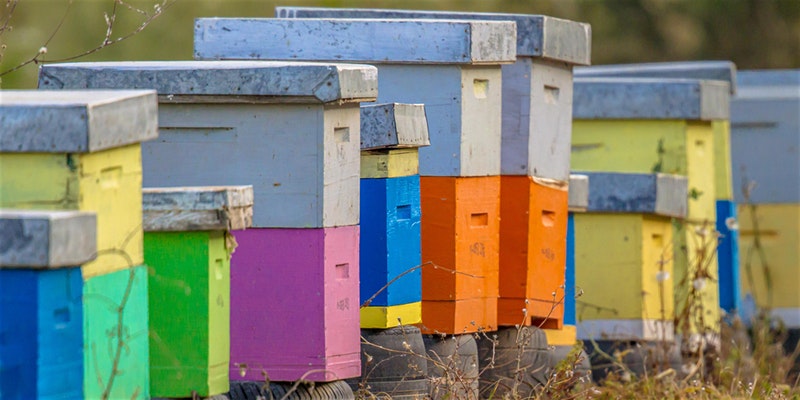Want to help your planet? Want to have free honey? Want a new hobby? Sounds like you might be the perfect candidate for a thousand little friends called honey bees.
Products from the Hive
Products from the hive are one of the primary reasons that people keep bees, the most popular one being honey. A healthy hive can produce anywhere from 30 to 60 pounds of honey a year! Beeswax is another product that’s pretty popular. Worker bees make wax in special glands in their abdomen before shaping the wax into the iconic honeycomb structure that makes up their home. Beeswax is also used by humans in candle-making, seals, soaps, lubricants, and cosmetics. You can even learn how to make your own lip balm.
Pollination
Many farmers and gardeners keep bees for their pollinating ability as well. While honeybees are not the only pollinators out there, keeping honey bees greatly increases the amount of pollination that goes on in flowering plants. This means a higher yield for your garden while also helping to boost the pollination of local flora as well!
Low Maintenance
Beekeeping is a pretty hands-off endeavor; once you have a healthy hive established the bees only need about an hour of attention a week to make sure the hive and honey bees are happy, healthy, and doing what they need to do. Keep in mind that with colder climates, the bees may need a bit more help overwintering.
BUILT-IN SOCIAL DISTANCING!
These days we can’t seem to find enough things to do that are safely distanced from others. We can assure you, that beekeepers generally enjoy the peace and solitude of managing their hives without anyone around. Of course, there are tens of thousands of bees up close and personal.
Things To Consider
As rewarding and fun as beekeeping is, there are some serious drawbacks to consider before deciding if keeping bees is right for you.
Non-Native Bees
Honey bees are a non-native species – as important as honey bees are to modern agriculture, much of the local pollinating is actually done by native wild bees (often called mason bees), and there is some concern about honey bees competing with these natives. If you’re not looking to use or sell bee products, consider posting a solitary bee house or planting a pollinator garden for the added boost of pollination for your farm or garden.
Bee Stings
Bees can and will sting people if they feel threatened or if they think you’re a threat to the hive. Knowing how to properly manage your hive will greatly decrease the risk, but bee stings do happen. Be wary and check to see if you’re allergic to their venom before you decide if beekeeping is right for you.
Cost of Supplies
The initial cost of beekeeping supplies can be very expensive; gear and clothing alone can cost around $200, a single new hive is around $150, and a new package of bees can be anywhere from $125 – $225. Must-have items include a hive, proper protective clothing, a smoker, and a hive tool. Starter kits are easy to find and usually offer a better-combined price. Ask one of our trained beekeepers on staff to help guide you to the best products for your goals and budget. Expect to spend around $1000 to get started with two hives.
The First Year Is Always The Hardest
The first year of beekeeping is all about patience, and getting to know your bees. Just as your first year will be about setting up and learning about beekeeping, your bees are just settling in for this period. Don’t expect much, if any, honey for yourself during the first year – the bees use this time to build the honeycomb and begin storing honey for the winter.
Keeping your hive happy and healthy can be hard, with bee populations on the decline in the past couple of years for a variety of reasons. Pesticides, parasites, and disease are the most common factors, but sometimes there’s no reason for a hive not to be healthy. Do your research and don’t hesitate to reach out and ask questions to others in your beekeeping community.
Join a Beekeeping Community
A great way to learn more about beekeeping, whether you’re still debating if it’s something you want to do or if you’ve decided to take the plunge, is to join a beekeeping community. Local beekeepers and beekeeping organizations are excellent resources if you have any questions, and they often meet in public libraries. Many local clubs even provide mentors. Asking an experienced beekeeper to show you the ropes is a great way to determine if beekeeping is right for you, and a great way to learn as much as you can before setting up your own hive.


